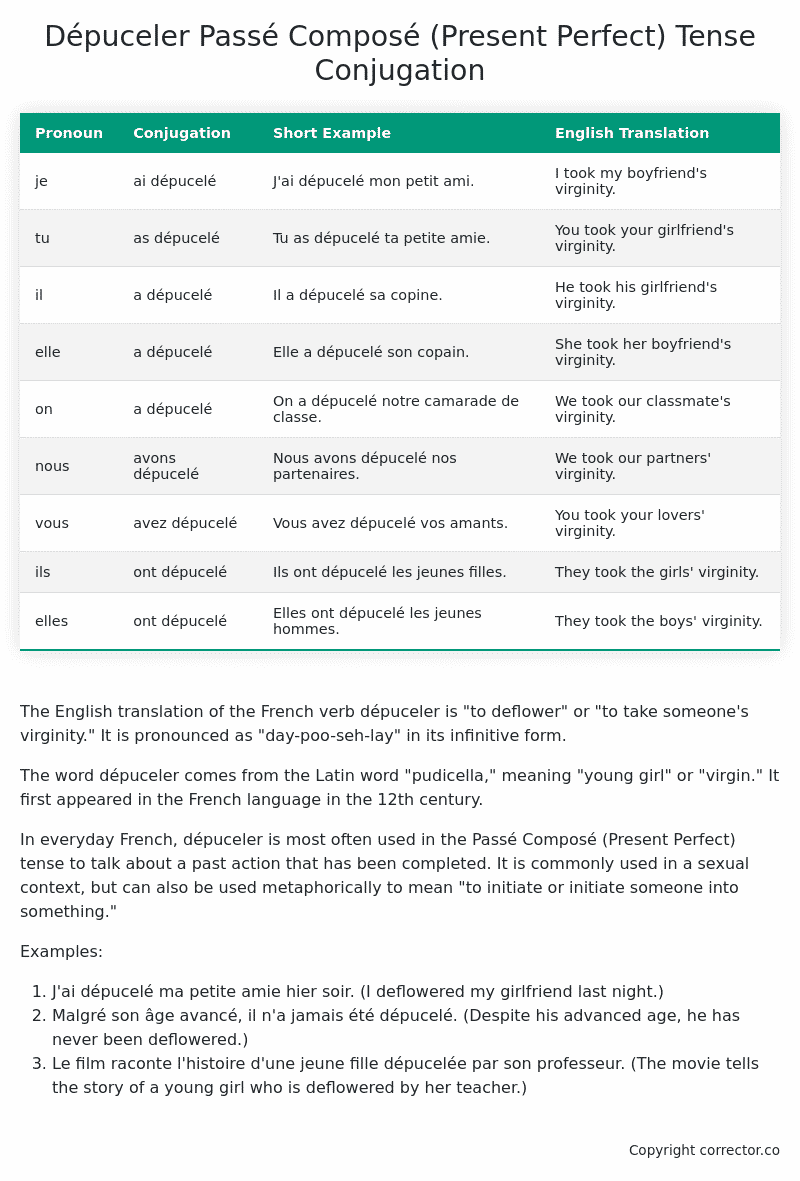Passé Composé (Present Perfect) Tense Conjugation of the French Verb dépuceler
Introduction to the verb dépuceler
The English translation of the French verb dépuceler is “to deflower” or “to take someone’s virginity.” It is pronounced as “day-poo-seh-lay” in its infinitive form.
The word dépuceler comes from the Latin word “pudicella,” meaning “young girl” or “virgin.” It first appeared in the French language in the 12th century.
In everyday French, dépuceler is most often used in the Passé Composé (Present Perfect) tense to talk about a past action that has been completed. It is commonly used in a sexual context, but can also be used metaphorically to mean “to initiate or initiate someone into something.”
Examples:
- J’ai dépucelé ma petite amie hier soir. (I deflowered my girlfriend last night.)
- Malgré son âge avancé, il n’a jamais été dépucelé. (Despite his advanced age, he has never been deflowered.)
- Le film raconte l’histoire d’une jeune fille dépucelée par son professeur. (The movie tells the story of a young girl who is deflowered by her teacher.)
Table of the Passé Composé (Present Perfect) Tense Conjugation of dépuceler
| Pronoun | Conjugation | Short Example | English Translation |
|---|---|---|---|
| je | ai dépucelé | J’ai dépucelé mon petit ami. | I took my boyfriend’s virginity. |
| tu | as dépucelé | Tu as dépucelé ta petite amie. | You took your girlfriend’s virginity. |
| il | a dépucelé | Il a dépucelé sa copine. | He took his girlfriend’s virginity. |
| elle | a dépucelé | Elle a dépucelé son copain. | She took her boyfriend’s virginity. |
| on | a dépucelé | On a dépucelé notre camarade de classe. | We took our classmate’s virginity. |
| nous | avons dépucelé | Nous avons dépucelé nos partenaires. | We took our partners’ virginity. |
| vous | avez dépucelé | Vous avez dépucelé vos amants. | You took your lovers’ virginity. |
| ils | ont dépucelé | Ils ont dépucelé les jeunes filles. | They took the girls’ virginity. |
| elles | ont dépucelé | Elles ont dépucelé les jeunes hommes. | They took the boys’ virginity. |
Other Conjugations for Dépuceler.
Le Present (Present Tense) Conjugation of the French Verb dépuceler
Imparfait (Imperfect) Tense Conjugation of the French Verb dépuceler
Passé Simple (Simple Past) Tense Conjugation of the French Verb dépuceler
Passé Composé (Present Perfect) Tense Conjugation of the French Verb dépuceler (this article)
Futur Simple (Simple Future) Tense Conjugation of the French Verb dépuceler
Futur Proche (Near Future) Tense Conjugation of the French Verb dépuceler
Plus-que-parfait (Pluperfect) Tense Conjugation of the French Verb dépuceler
Passé Antérieur (Past Anterior) Tense Conjugation of the French Verb dépuceler
Futur Antérieur (Future Anterior) Tense Conjugation of the French Verb dépuceler
Subjonctif Présent (Subjunctive Present) Tense Conjugation of the French Verb dépuceler
Subjonctif Passé (Subjunctive Past) Tense Conjugation of the French Verb dépuceler
Subjonctif Imparfait (Subjunctive Imperfect) Tense Conjugation of the French Verb dépuceler
Subjonctif Plus-que-parfait (Subjunctive Pluperfect) Tense Conjugation of the French Verb dépuceler
Conditionnel Présent (Conditional Present) Tense Conjugation of the French Verb dépuceler
Conditionnel Passé (Conditional Past) Tense Conjugation of the French Verb dépuceler
L’impératif Présent (Imperative Present) Tense Conjugation of the French Verb dépuceler
L’infinitif Présent (Infinitive Present) Tense Conjugation of the French Verb dépuceler
Struggling with French verbs or the language in general? Why not use our free French Grammar Checker – no registration required!
Get a FREE Download Study Sheet of this Conjugation 🔥
Simply right click the image below, click “save image” and get your free reference for the dépuceler present perfect tense conjugation!

Dépuceler – About the French Passé Composé (Present Perfect) Tense
Formation of the Passé Composé
Set the auxiliary verb with either
Conjugate the auxiliary verb
Add the past participle
Common everyday usage patterns
Narrating Past Events
Sequential Actions
Describing Completed Actions
Interactions with other tenses
Imperfect Tense
Conditional and Future Tenses
Summary
I hope you enjoyed this article on the verb dépuceler. Still in a learning mood? Check out another TOTALLY random French verb conjugation!


